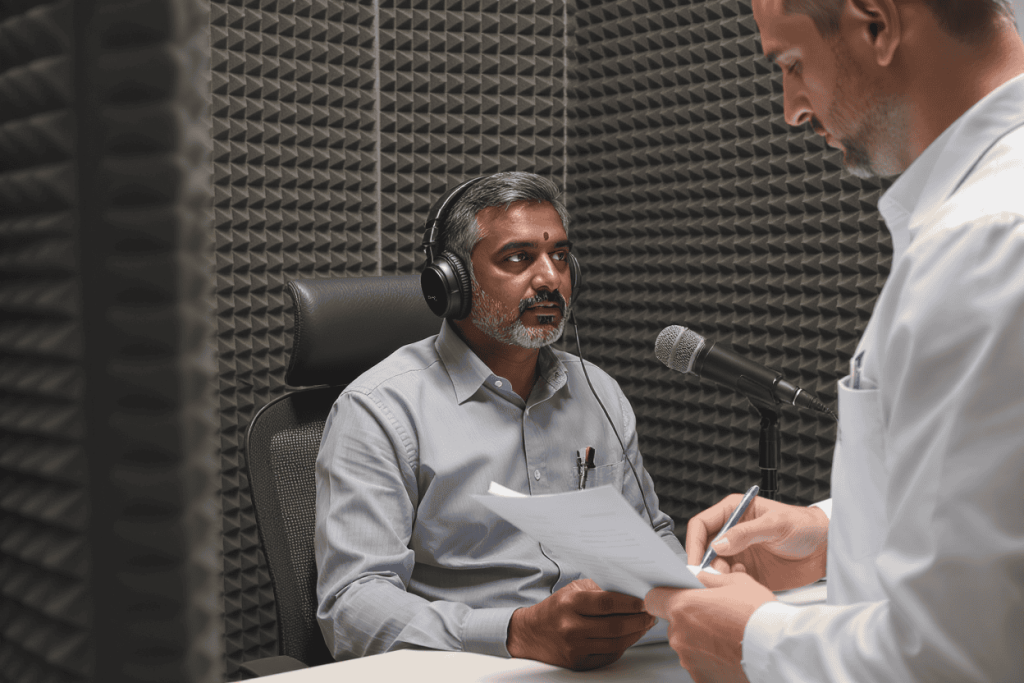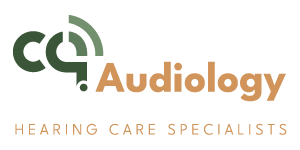If you’ve been diagnosed with hearing loss, you’ll find multiple treatment options available. For mild cases, doctors may prescribe medications or recommend hearing aids with advanced features like digital processing and smartphone connectivity. More severe cases might require surgical interventions or cochlear implants. Your treatment plan will depend on whether you have conductive, sensorineural, or mixed hearing loss. Understanding your specific condition will help determine the most effective solution for your needs.

Understanding Types and Causes of Hearing Loss
Before exploring treatment options, it’s essential to understand that hearing loss comes in several distinct forms. The three main types are conductive, sensorineural, and mixed hearing loss.
Conductive hearing loss occurs when sound can’t properly travel through your outer or middle ear, often due to ear infections, earwax buildup, or damaged eardrums. Sensorineural hearing loss involves damage to your inner ear or auditory nerve, typically caused by aging, noise exposure, or certain medications.
Mixed hearing loss combines both types. Common causes include genetics, head trauma, and chronic diseases like diabetes. You might experience gradual or sudden hearing loss, and symptoms can range from difficulty hearing high-pitched sounds to complete deafness in one or both ears.
Medical and Surgical Treatment Options
While some hearing loss cases require only minor interventions, others need advanced medical or surgical solutions. Your doctor might prescribe antibiotics to treat ear infections or corticosteroids to reduce inflammation and swelling. For more severe cases, surgical options include cochlear implants, which bypass damaged parts of the inner ear to directly stimulate the auditory nerve.
You might also benefit from bone-anchored hearing systems if you have conductive hearing loss or single-sided deafness. These devices transmit sound through your skull bone to your inner ear. Other surgical procedures include stapedectomy to replace damaged bones in your middle ear, or tympanoplasty to repair a perforated eardrum. Your ENT specialist will determine which treatment option is most suitable for your specific condition.
Hearing Aid Technologies and Solutions
Modern hearing aids represent the most common solution for hearing loss when surgery isn’t necessary. These devices come in various styles, from behind-the-ear models to nearly invisible in-canal options. You’ll find features like digital sound processing, smartphone connectivity, and background noise reduction in today’s advanced models.
Your audiologist can help you choose between different technologies, including completely-in-canal (CIC) aids that fit entirely in your ear canal, receiver-in-canal (RIC) devices that are discreet yet powerful, or traditional behind-the-ear (BTE) models. Many newer hearing aids offer Bluetooth connectivity, allowing you to stream audio directly from your phone or TV. They can also automatically adjust to different environments and even help manage tinnitus through built-in sound therapy features.
Cochlear Implants and Other Implantable Devices
For patients with severe hearing loss who don’t benefit from traditional hearing aids, cochlear implants provide a surgical solution that bypasses damaged parts of the ear. These electronic devices convert sound into electrical signals that directly stimulate your auditory nerve, restoring a sense of sound.
Beyond cochlear implants, you might be a candidate for other implantable devices. Bone-anchored hearing systems (BAHS) work by conducting sound through your skull bone to your inner ear, ideal if you have conductive hearing loss or single-sided deafness. Middle ear implants attach directly to the small bones in your middle ear, offering an alternative when traditional hearing aids aren’t suitable. Your audiologist and ENT specialist will help determine which implantable device best matches your specific hearing loss condition.
Communication Strategies and Support Systems
Three essential communication strategies can help you adapt to hearing loss: lip reading, active listening techniques, and clear speech advocacy. You’ll find that learning to read lips can significantly improve your understanding during conversations, especially in noisy environments. Active listening involves positioning yourself to see speakers clearly and minimizing background distractions.
Support systems are equally crucial for managing hearing loss effectively. You can join support groups where you’ll meet others facing similar challenges and share coping strategies. Don’t hesitate to inform family, friends, and colleagues about your hearing loss and specific communication needs. They can help by speaking clearly, facing you directly, and ensuring proper lighting. Many organizations also offer counseling services and educational resources to help you and your loved ones navigate the emotional and practical aspects of hearing loss.
Lifestyle Modifications and Prevention
Making simple lifestyle changes can significantly protect your remaining hearing and prevent further loss. You’ll want to limit exposure to loud noises by wearing protective earmuffs or earplugs when in noisy environments. Keep your music volume at 60% or lower, especially when using headphones.

Maintain good cardiovascular health through regular exercise and a balanced diet, as blood flow affects inner ear function. If you smoke, quit – smoking can damage hearing by reducing oxygen flow to the ear cells. Monitor medications that might affect hearing, and discuss alternatives with your doctor. Regular ear checkups help detect potential issues early. Keep your ears dry to prevent infections, and clean them properly without using cotton swabs, which can damage your ear canal.
Alternative and Emerging Therapies
While traditional treatments remain common, several promising alternative and emerging therapies show potential for hearing loss treatment. You might want to explore acupuncture, which some studies suggest can improve nerve function and reduce tinnitus symptoms. Hyperbaric oxygen therapy is gaining attention for treating sudden hearing loss by increasing oxygen flow to damaged ear tissues.
Researchers are also making progress with stem cell therapy, which could potentially regenerate damaged hair cells in your inner ear. Gene therapy shows promise in treating hereditary hearing loss by correcting faulty genes. Additionally, there’s ongoing research into sound therapy protocols and specialized meditation techniques that may help manage hearing loss symptoms. These emerging options aren’t yet widely available, but they represent exciting possibilities for future treatment approaches.
